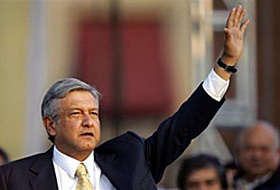 |
 |
 |
 News from Around the Americas | December 2005 News from Around the Americas | December 2005  
A Leftist Victor in Mexico Race Would be no Trouble, U.S. Says
 Alfredo Corchado & Tim Connolly - Dallas Morning News Alfredo Corchado & Tim Connolly - Dallas Morning News


| | Andres Manuel Lopez Obrador, waves to supporters as he arrives at Mexico City's main Zocalo plaza to accept his nomination as the the Democratic Revolutionary Party (PRD) presidential candidate for the 2006 elections earlier this month. (AP/Dario Lopez-Mills) |
Washington - Mexico's presidential election is more than six months away, but officials in Washington already are sizing up how the three leading candidates would mesh with the United States - including the possibility that the leftist former mayor of Mexico City could win it all in July.

In interviews, officials and scholars said the prospect that Mexico might elect a left-leaning president - as several other Latin American countries have in recent months, most recently Bolivia with its apparent election of Evo Morales - did not pose a problem for the United States.

In Mexico, former Mexico City Mayor Andres Manuel Lopez Obrador leads in early voter opinion polls, although his numbers have begun to slip. Meanwhile, Felipe Calderon of President Vicente Fox's conservative National Action Party, or PAN, is gaining, while Roberto Madrazo of the Institutional Revolutionary Party, or PRI, remains close in third place.

Lopez Obrador is sometimes compared to Venezuela's President Hugo Chavez, who is seen as both a champion of the poor and a staunch critic of U.S. policies in the region. But Armand Peschard-Sverdrup, head of the Mexico Project at the Center for Strategic and International Studies, said the comparison is overstated.

"There are similarities in leftist strategies," Peschard-Sverdrup said, noting that both leaders have comparable grassroots support and an anti-establishment image. "But there are differences in political ideology," he added, describing Lopez Obrador as far more pragmatic and politically experienced, having held various offices. Chavez was a clear outsider before he rose to power.

And though both men may be viewed as nationalistic, Lopez Obrador is probably someone the United States can work with, said a U.S. official, speaking on the condition of anonymity.

"There may be a sense of nationalism on his part," the official said. "But with a sense of sensitivity on both sides, we can probably work successfully on issues."

To be sure, the U.S. official added, Lopez Obrador "probably wouldn't be the ideal candidate from Washington's perspective, if one can speak for Washington on that, but I think he's still a candidate that the United States can work with. There are sufficient constraints on any Mexican president that I wouldn't see him as a Chavez clone."

For more than 70 years, the U.S. government dealt with a semi-authoritarian Mexican government run by the PRI. In 2000, voters kicked out the PRI by electing Fox to office, raising expectations that leaders from both countries would enjoy greater cooperation. While officials in both countries point to increased law enforcement collaboration, other goals, such as immigration reform, have languished, in part because the Sept. 11 attacks generated fears of open borders.

But a PRI victory in July's presidential election could work to Washington's advantage, said Raul Benitez Manaut, a political analyst and military expert at the National Autonomous University of Mexico.

Speaking at the Woodrow Wilson Center in Washington, Benitez explained: "For 71 years, the United States dealt with the PRI. They know what they get. There are no secrets here. They know how the PRI thinks, how they act and what to expect from them. That's a huge plus for the United States government."

For his part, Calderon of the PAN has shown himself as a strong debater and a force to be reckoned with, the U.S. official said, but he must distance himself from Fox.

While Fox remains personally popular, his administration has been a disappointment to many.

Crime and jobs remain the two biggest issues in Mexico and throughout Latin America, the official added.

Next year's election is up for grabs, but for all the talk of political modernity, Mexican voters remain extremely sensitive to any hint of U.S. influence, said a senior Bush administration official, meaning the U.S. government must be a silent onlooker.

"The U.S. is always the elephant in the room in any political election," the official said. "This is particularly true for elections in Mexico." | 
 | |
 |



